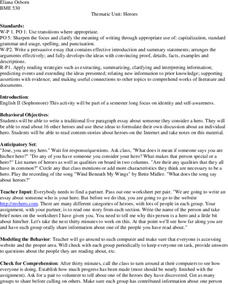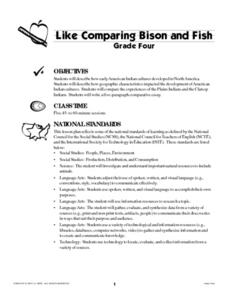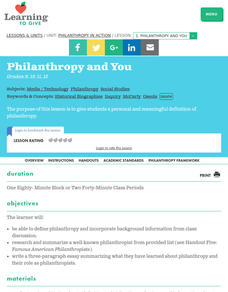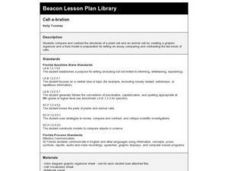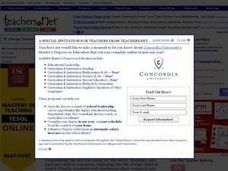Curated OER
Famous People Lesson Plan
Students brainstorm a list of the achievements of people in their lives. In groups, they discuss the decisions that help people meet their goals later in life and identify values that help one overcome obstacles. They use the internet...
Curated OER
Night by Elie Weisel
Students read "No News from Auschwitz" and answer the study questions as an introduction to the novel. They record reactions to the essay and compare with reactions after reading "Night".
Curated OER
Creating a Travel Brochure
Students use the internet to research a country of interest to them. Using graphics, they create a travel brochure about the country encouraging people to travel there. They present their information to the class while showing their...
Curated OER
Heroes
Tenth graders participate in research and class discussion before attempting to write a traditional five paragraph essay. They use the examples of 16 other hero stories to consider. Students use examples and descriptive details to...
Curated OER
Go For The Gold!
Third graders read fiction and nonfiction works for comprehension. Using the internet, 3rd graders participate in a WebQuest. They compare and contrast the Olympics in ancient Greece to the modern day Olympics. Afterwards, students...
Curated OER
Oregon Trail Art
Students describe events that happened on the Oregon Trail and in the daily lives of Native Americans by writing a narrative essay of a family traveling through Nebraska based on Thomas Hart Benton's paintings.
Curated OER
Regents High School Examination Comprehensive Examination in English Session One (2006)
In this Regents High School Examination Comprehensive Examination in English worksheet, students listen to a speech and answer reading comprehension questions. Students then compose an essay based on the information.
Curated OER
A Never-Before-Seen Creature
Students construct a never-before-seen creature in part of an analysis of societal injustices and discrimination. In this societal issues lesson, students create a creature called a Man-Droid as a study about the differences among...
Curated OER
Like Comparing Bison and Fish
Fourth graders study the development of North American Indian cultures by looking at how geography impacted their development. They write a five paragraph essay comparing the Plains Indians and the Clatsop Indians.
Curated OER
Philanthropy and You
Students define and discuss philanthropy. They research a philanthropist and write a three-paragraph essay summarizing what they have learned , including their own roles as philanthropists. They also plan and initiate personal acts of...
Curated OER
Cell-a-bration
Fifth graders study the structures of a plant cell and animal cell. They create a graphic organizer and a food model. Finally, they write an essay comparing and contrasting plant and animal cells.
Curated OER
Teaching Night with Web Research Assignments
Learners research the Holocaust. They read the autobiography, Night, by Elie Wiesel, conduct research on a child of the Holocaust, and write an essay comparing/contrasting the life of their selected child with that of Elie Wiesel.
Curated OER
Recap and Activities (Reveloutionary War Era)
Eighth graders discuss the importance of the Second Continental Congress. They compare and contrast present-day athletic mascots and their roots in the Revolutionary War. After discussing Loyalists and Patriots, 8th graders write...
Curated OER
What is an Organism?
Sixth graders take a pre-test and summarize teacher's discussion of cells, tissues, organs in their notebooks. They read selections on organisms in their textbook and perform a dissection of a chicken drumstick with the thigh attached....
Curated OER
Kolam: A Living Art of South Asia
Students will read the short story "Meenakshi's Magic Hands" by Santhini Govindan and view a slide show of photo images interspersed with the text to learn of the art form of Kolam. Students read and reflect upon a nonfiction essay,...
Curated OER
Focusing with Anticipation Guides
Students write with a sharp, distinct focus identifying topic, task and audience. They discuss anticipatory statements with supporting details. Students create an essential question at the beginning of a composition, novel, or unit.





